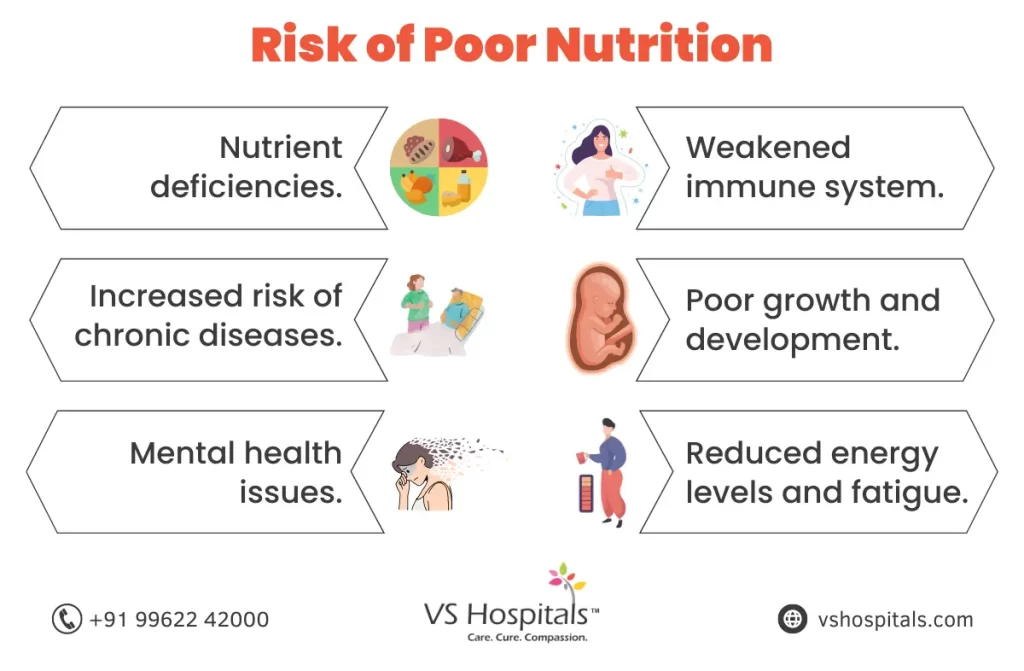Are you feeling tired, stressed, or apathetic? Did you know that these common signs can indicate a diet lacking in nutritional value? If you are dieting, ill, or eating a fast-food diet, you should be concerned that you and your family are getting proper nutrition from your food else it would lead to health risk of poor nutrition.
We will explore the potential health risks of a poor diet and shed light on the importance of making informed choices when it comes to what we consume.
Health Risk of Poor Nutrition Diseases
The risks of unhealthy eating or poor nutrition are associated with numerous diseases and health conditions:
- Obesity: Excessive intake of processed foods, unhealthy fats, and sugary drinks leads to weight gain and increases the risk of obesity.
- Type 2 Diabetes: Diets high in refined carbs and sugary foods contribute to insulin resistance, raising the likelihood of developing diabetes.
- Cardiovascular Disease: A diet rich in saturated fats, cholesterol, and sodium from processed foods can elevate poor nutrition diseases like blood pressure and promote heart disease.
- Hypertension: High sodium intake from processed foods causes fluid retention and raises blood pressure levels.
- Osteoporosis: Inadequate intake of calcium and vitamin D can weaken bones and increase the risk of fractures.
- Certain Cancers: Poor nutrition, low in fruits, vegetables, and whole grains, raises the risk of colorectal, breast, and prostate cancers.
- Dental Problems: The risks of unhealthy eating of excessive sugar consumption lead to tooth decay and gum disease.
- Weakened Immune System: Insufficient nutrients compromise immune function, making individuals more vulnerable to infections.
- Mental Health Disorders: Nutritional deficiencies, particularly omega-3 fatty acids, and B vitamins, are linked to depression and anxiety.
- Nutrient Deficiencies: Inadequate intake of essential nutrients results in deficiencies like anemia and vitamin deficiencies.
Prioritizing a balanced, nutrient-rich diet is essential for reducing poor nutrition diseases and maintaining optimal health.

Nutrition: Assessing, Balancing, and Nourishing for Optimal Health
How can you determine if you are receiving adequate nutrition?
If you find that a day goes by and the only thing you’ve had to eat is a burger and coffee or maybe some fast food you will no doubt experience the physical effects or health risk of poor nutrition. Insufficient mental clarity, weakness, and irritability are indicators of inadequate nutrition, suggesting that you haven’t provided your body with sufficient nourishing food.
Conversely, regularly indulging in high-calorie diets can lead to the effects of overnutrition, which may be observed in both yourself and your children. Consider the health risks of a poor diet as weight gain and related symptoms will also zap your energy and put a strain on your body.
Under and over nutrition. Finding balance.
Your diet is a crucial element to feeling good, strong, and alert. If you’ve been suffering from a diet lacking in nutrition, or an overindulgence in nutrition, you’ll certainly be feeling the effects on your overall health – and even worse – you may be setting yourself up for a more serious disease.
You obviously need calories for energy. It is vital to obtain the necessary number of calories every day to maintain your optimum health. Individuals who do not take in the proper number of calories because of ill health, physical disability, dieting, or problems with absorption, usually begin to lose weight, lack concentration, and as time passes, they begin to lose the function of organs such as the reproductive system and eventually major functions of the heart and lungs. Intake of food that is high in calories will also increase the health risk of poor nutrition.
More common than undernutrition, obesity puts a strain on the organs and increases the risk for health problems such as diabetes, heart disease, and even cancer. Knowing what a typical serving size of food is can help you determine if you (or a family member) are taking in the appropriate number of calories. It is important for parents to teach children moderate eating habits and the health risks of a poor diet to ensure good eating for life. I cannot stress this point enough!
How nutritious is your food?
Aside from merely watching caloric intake, it is important that your diet has strong nutritional value and aids you to avoid the risks of unhealthy eating. Consuming an entire box of doughnuts may fulfill your calorie needs, but it does not fulfill your daily requirements for essential vitamins, protein, calcium, and other minerals.
Choosing a diet that lacks nutrition on a regular basis will lead to health risk of poor nutrition such as lowered resistance to illness, general weakness, and irritability. Insufficient calcium intake, among other dietary deficiencies, can increase the risk of developing more severe conditions like osteoporosis.
While pregnant and/or lactating women, the elderly, and ill individuals may have no choice but to supplement their diet with multivitamins, the average healthy person should make an effort to get most of the nutrition they need by means of a normal diet that includes fruit, vegetables, protein (lentils and meat), dairy and fibre bread and cereals.
So, what about the occasional burger?
Fast food can be relatively harmless if indulged in occasionally, but its negative consequences may become evident if it becomes a staple in one’s diet. Educating yourself and your family on what a healthy diet is besides knowing the health risk of poor nutrition will help you and your family feel great and enjoy good health for years to come.
Conclusion
The overall state of your health and well-being is significantly influenced by the diet you follow. Opting for fast food, processed meals, and sugary snacks instead of wholesome, nutrient-dense foods can cause health risk of poor nutrition. By making informed dietary choices and embracing healthier eating habits, you can take charge of your well-being and promote a healthier future.
Read also Diet Tips for Woman.
